The fascinating story of the rock and roll music scandal that put Bay City on the front page of Rolling Stone magazine on May 28, 1970.
By Daniel Ralston with Gary J. Johnson*
Chris White shakes his head and laughs when I show him the first photo. At 73, the bassist and songwriter for the reunited British psych-rock band the Zombies looks like a cool grandpa in black pants, blue dress shirt, and polar fleece vest — a sharp contrast from his septuagenarian bandmates who still sport leather jackets and tight pants. He adjusts his glasses and studies the image of the impostors, four flamboyantly dressed young men taken in 1969. We are backstage at the Saban Theatre in Beverly Hills last October and after this brief intermission, White will join the rest of the band onstage to play the band’s cult classic 1967 album Odessey and Oracle in its entirety.
I pull up another grainy photo from 1969 on my laptop: a traditional black and white press photo for the Original “Zombies” (in conspicuous scare quotes), autographed. There are only four guys pictured despite the fact that the Zombies were a five-piece. I inform White that the two young men wearing cowboy hats are Dusty Hill and Frank Beard from the legendary Texas blues-rock band ZZ Top, although the names D. Cruz and Chris Page are scrawled over them. The real Zombies would have never worn cowboy hats.
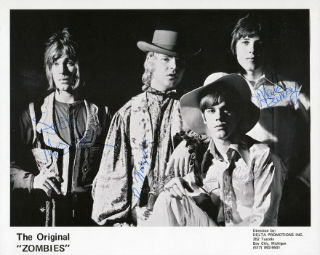 Seab Meador, Dusty Hill, Frank Beard, Mark Ramsey
Seab Meador, Dusty Hill, Frank Beard, Mark Ramsey
The Zombies quietly disbanded when Odessey and Oracle failed to make the charts. Nobody even saw fit to correct the unintentionally misspelled “Odessey” on the record’s cover, viewed in hindsight as typical psychedelic-era wordplay. Almost two years after their breakup, after little fanfare and two failed singles, the band’s U.S. label, Date Records, decided to release the track “Time of the Season” as a last-ditch effort; the song went to No. 1 in Cashbox and No. 3 on the Billboard chart and the Zombies were suddenly in demand.
The Zombies, unaware of their stateside success — this was possible in 1969 — had already moved on to new musical projects or day jobs. This vacuum meant anyone could tour the United States pretending to be the Zombies, even a four-piece blues band from Dallas. As the Beatles and Stones went from garage and blues rock beginnings to more adventurous music, the Zombies took their early, more raucous hits (“She’s Not There,” “Tell Her No”) and refined them. But replicating a refined sound was hardly the priority.
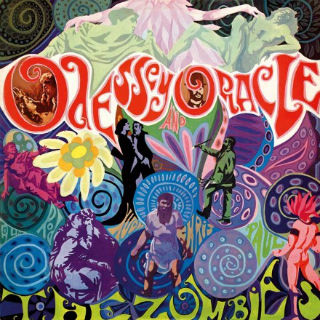 Odessey and Oracle album
Odessey and Oracle album
There were in fact two different bands touring the United States in 1969 calling themselves the Zombies. Both impostor groups were managed by the same Bay City company, Delta Promotions, the owners of which insisted they’d legally acquired the songs of the Zombies and other bands. It was an operation that would be impossible to attempt today, perpetrated in an era when fans didn’t have unlimited access to artists’ whereabouts, or, in some cases, even know what they looked like.
In the history of American popular music, artists have often been seen as interchangeable by the industry that promotes and distributes them. In the doo-wop era, if a member of a popular group pushed back against a manager or label boss, they were simply sent packing, with a new, more compliant candidate brought in to replace them. Over the course of their existence, the Drifters have had somewhere around 60 members.
It was in this climate that Delta Promotions took this exploitation to a new extreme, figuring out a way to tour and sell “the Zombies” and other bands without those bands or their fans even realizing. As the British Invasion spurred rock’s cultural explosion in the ’60s, there simply weren’t yet enough of these upstart bands touring North America to meet the demand. So they made some up.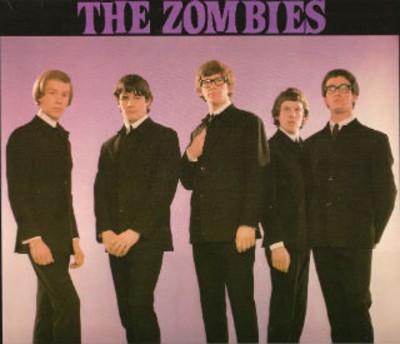 Hugh Grundy, Colin Blunstone, Chris White, Rod Argent, Paul Atkinson
Hugh Grundy, Colin Blunstone, Chris White, Rod Argent, Paul Atkinson
Nearly 50 years later, what happened with the Zombies is now more myth than scandal, hazy details further lost to history, with many of its principal players gone or forgotten. But, in terms of sheer audacity and brazenness, it’s a story that’s still hard to top.
Before he joined Hill and Beard in the Texas band that passed itself off as the Zombies, Mark Ramsey was 18 years old and living on the outskirts of Dallas. He was good-looking, he had a sweet girlfriend named Vicki, and he loved playing guitar. During his senior year of high school, a Texas blues band called the Gentlemen came to play a school-sponsored rock concert, featuring neighborhood hotshot guitarist — and future fellow fake Zombie — Sebastian “Seab” Meador. The Gentlemen had scored a minor hit with their single “It’s a Cry’n Shame” in 1966 when Meador was only 16, and Ramsey couldn’t pass up the opportunity to introduce himself.
Ramsey remembers meeting Frank Beard later at a spot in Fort Worth called Pizza Inn, where they became fast friends. Beard knew everyone in the Dallas music scene and was noted for playing a drum kit with two bass drums, the mark of a badass drummer in 1969. Beard was already friends with Dusty Hill, and he took Ramsey to see Hill’s band American Blues. 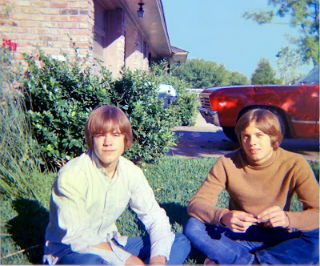 Frank Beard and Mark Ramsey in Texas
Frank Beard and Mark Ramsey in Texas
It wasn’t long after that that Ramsey got the call to join the fake Zombies, which at the time featured Beard, Hill, and Meador. He isn’t exactly sure how the offer came about, and is unsurprisingly fuzzy about some of the details of the era. “The ‘60s were consumed with the fascination of experimentation,” he says now, wryly. “Frank was the one who approached me.”
Frank Beard and Dusty Hill declined to be interviewed for this story, but Hill did respond to fact-checking questions by email via his manager — the first time either ZZ Top member has ever publicly acknowledged involvement in the Zombies scheme. Like Ramsey, however, Hill said he couldn’t recall how the band got started: “It was the ’60s, man.” Ramsey believes they were connected with Delta Promotions through someone Meador met on tour with the Gentlemen in Florida. The players were told that the operation was perfectly legal, according to Ramsey.
“As far as the Zombies, I was told they didn’t exist,” he recalls. “That they were only a studio sound. I was just excited and flattered. I’d only been playing for a few years and the other guys were pro-level at that point. I didn’t look at it as anything more than a chance to have some fun, hang out with some cool guys, learn some songs, go somewhere outside of this Hillbillyville, and earn a little money.”
As a warm-up for the Zombies tour, Delta Promotions asked the Texas Zombies to go on a short tour as a different, less successful, also recently disbanded group called the Rose Garden, a Los Angeles folk-rock quintet who had a Top 20 hit in 1967 with the song “Next Plane to London.” Ramsey remembers it being the only Rose Garden song they bothered learning; the rest of their set was blues. To everyone’s satisfaction, a small run of shows in the South went off without incident. 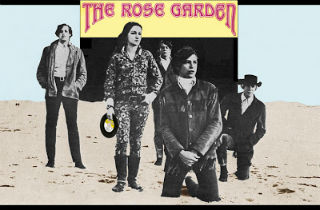
Audiences were so starved for live music that no one confronted the fake Rose Garden despite the fact that the real Rose Garden had a female lead singer, Diana DeRose. (DeRose hailed from West Virginia, but reportedly told people she was from Blackpool, England; fact-checking was not a priority in this era.) “People did start asking where the girl was but we did OK,” recalls Hill. The lack of repercussions emboldened them when they decided to tour without a keyboard player for their Zombies gigs. Ramsey remembers Beard telling people their keyboardist had gotten busted in Dallas and was stuck in jail.
After their Rose Garden tour, Ramsey, Meador, Hill, and Beard headed to Michigan to meet with the Delta Promotions team, get photos taken, and start their run as the Zombies. They were told to use their own clothes for the shoot — that’s where the cowboy hats came in.
“You’ll notice both Dusty and Frank are using stage names,” Ramsey says of the signed promo shot. “So it’s almost like they knew something was wrong here. Seab signed his real name like me, probably because, like me, he didn’t think we were doing anything wrong.” 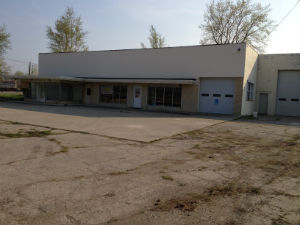 Former home of Delta Promotions in Bay City
Former home of Delta Promotions in Bay City
The building that housed the Delta Promotions offices still stands, just as it did in 1969, alone on a dusty stretch of Tuscola Road on the outskirts of Bay City, Michigan. From this secluded spot, local businessman Bill Kehoe and his partner Jim Atherton managed Question Mark and the Mysterians and a number of smaller local bands, including a power trio named Dick Rabbit. Tom Hocott was the first employee of Delta Promotions. He now lives in Grand Rapids where he plays music and lives a quiet life. He reluctantly agreed to meet me at a Chili’s outside of town to discuss his time with Delta Promotions. When we sit down to eat, he places a manila envelope on the table. He keeps his hand on it while telling me the story of his involvement with the fake Zombies.
Before the decline of the major label system and the rise of the internet and social media, enterprising and less than scrupulous businessmen ran the industry with relative impunity, with artists serving primarily as commodities to be exploited. Famously, Elvis’s manager Colonel Tom Parker pocketed anywhere from 25 to 50% of the star’s gross income for the duration of his career. Allen Klein, who managed the Rolling Stones after the release of “(I Can’t Get No) Satisfaction” in 1965, promptly signed the band’s publishing rights to his own company ABKCO, resulting in a string of lawsuits spanning decades. If this treatment was the norm for the era’s biggest stars, it’s not hard to imagine how lesser lights would fare. 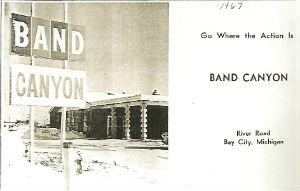
Delta promoted its groups and put on shows at Band Canyon, the venue Kehoe owned in Bay City. “I remember it starting out pretty legitimate,” Hocott says. “Then Kehoe started telling me that they’d acquired the rights to the music and the names of these bigger bands like the Zombies and the Animals … I knew it was probably bullshit but I guess I didn’t care. I was happy to be working in music.” Hocott is the only Delta Promotions employee who would talk about the operation. Bill Kehoe died in 1990. As for Kehoe’s former partner Jim Atherton, attempts to locate him were unsuccessful at the time of this writing.
Delta Promotions had not received any negative publicity until 1968 when Hocott, the members of Dick Rabbit, along with a few others (including Jim Atherton) were busted for selling marijuana out of a rented house of Bay City's west side. The police also found firearms on the premises. Atherton was able to post bail, but Hocott and the others spent a few nights in jail. Hocott believes his boss, Bill Kehoe, pulled strings with his firends in local government to get them out. Although the marijuana bust was front page news in the Bay City Times, the charges against all of them were dropped.
In what amounted to a comedy of errors, Hocott stated that the Michigan State Police lost part of the evidence against them, and the girl who had informed on them left town and the police couldn't find her to testify in court. Worst of all, it was discovered that when the officers busted the house, they had the wrong address on the search warrant and first went into a neighboring home. Hocott recalled the event: "The residents told them that the hippies were next door." The police failed to get a new search warrant, however, and the case was eventually thrown out by the judge.
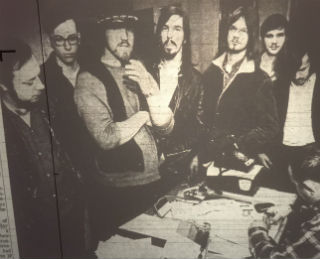 Hocott (L) and members of Dick Rabbit after the bust.
Hocott (L) and members of Dick Rabbit after the bust.
Following the failed bust, Jim Atherton left Delta Promotions and moved to Boston. He began working there as a manufacturing representative for Sunn Amplifiers and was not involved in the Fake Zombies scandal.
Delta Promotions was the first to notice the Zombies void in America. The plan was simple: Find competent musicians, convince them Delta was on the level, get them to a reasonable point of Zombies-like ability, and send them on the road. Once the prep was completed, they’d send the bands on tour while Delta took a healthy slice of the profits. Bay City, quiet and isolated from any prominent record labels or magazines, proved the perfect spot to operate. Delta Promotions could work in relative obscurity, sending its fake bands into metropolitan areas to absorb the risks while Kehoe and Hocott laid low. As for how the Texas Zombies got on Delta’s radar, Hocott remembers Kehoe having connections in Florida. He also recalls meeting someone who matches the description of Seab Meador months before the Texas Zombies tour. 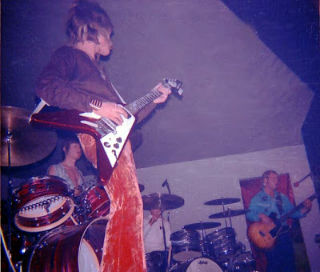 Meador playing his Flying V with Beard and Hill
Meador playing his Flying V with Beard and Hill
“This guy,” he says, pointing at a photo I show him of Seab Meador. “He came through Michigan first. I remember that haircut and he played a red Gibson Flying V guitar.” In one of the photos Ramsey handed me, Seab Meador is seen playing a red Flying V.
June 22, 1969, was a rough night for the fake Zombies from Texas. According to the Saginaw News, the band was “especially disappointing” and “the crowd began to leave during their fourth tune.” The newspaper also says the band didn’t sound like they did back when they were selling millions of records. The change in sound is attributed to “a complete transition of band members…except the bass player.”
The other bands on the bill didn’t fare much better. The shambolic and chaotic nature of the Michigan rock ‘n’ roll scene was on full display that night. Openers Dick Rabbit threw copies of their new single into the crowd. According to the review, “Several of the records were thrown back” once the band started playing. Headliners and local heroes Question Mark and the Mysterians fared no better. They performed the entire first song before realizing the mics weren’t working. The one song everyone in the crowd came to see, “96 Tears,” could not be performed because the band’s organist had quit a week earlier and they couldn’t find anyone to fill in. According to the review, “When their 40-minute set was finally finished…there was no applause — nothing but dead silence.” 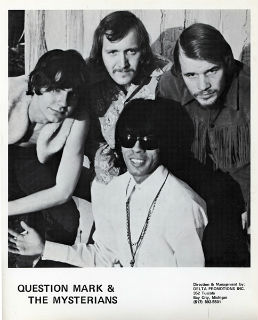 ? and some new Mysterians
? and some new Mysterians
This account makes it easy to understand how a group of guys from Texas could breeze into a town calling themselves the Zombies, play a show, and then leave without incident. Locally produced rock ‘n’ roll shows were often a disorganized mess. Most local reviews from the era mention bad sound, shoddy playing, and unimpressed audiences. The fake Zombies fared no worse than the real Question Mark and the Mysterians, who were themselves something of an off-brand version of their original incarnation by 1969, featuring only one original member. Even the real bands felt like impostors.
“I think the reviewer must have been drunk,” Mark Ramsey says of the Saginaw show. “I don’t remember anyone walking out. Were we perfect? No, and we weren’t the Zombies. We were a blues rock band from Texas, a band with plenty of good looks, better than the original Zombies.”
They played small clubs in Michigan and Wisconsin and went up into Canada, where they appeared on TV and played a gig in a prison — it’s there where Ramsey’s story begins to differ from that of Tom Hocott. “I have a feeling that they kinda divided from Delta Promotions and did their own thing,” Hocott says. “Can you imagine? I never would have sent them to prison!” 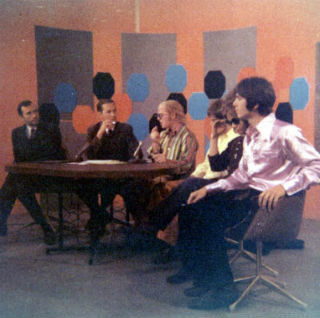 Fake Zombies on Canadian TV
Fake Zombies on Canadian TV
“I can’t remember how we got the gig,” remembers Dusty Hill, “but I remember a stage hand, an inmate, who was joking about escaping in my guitar case.”
Delta kept its operation simple. Hocott says the concert promoters in most cities knew they were getting fake versions of real bands. They operated as independent entities, each taking a huge percentage of the money earned. The bands had little recourse in asking for more. Ramsey remembers earning about $200 a week. As for the fans who were getting swindled, Hocott says, “When they were told, ‘Here’s the Zombies,’ they bought it. Even the strange parts, like the fact that they were touring without a keyboardist.” Fans left disappointed and the bands left town as quickly as possible. The less remembered, the better. “Then these guys came along.”
Hocott opens the manila envelope and hands me a stack of photos of the other fake Zombies. They are dressed in muted, vaguely psychedelic garb, ascots and striped trousers. It’s closer to the look of the actual Zombies. The second fake Zombies were a five-piece from Marquette, a city located in the Upper Peninsula of Michigan. 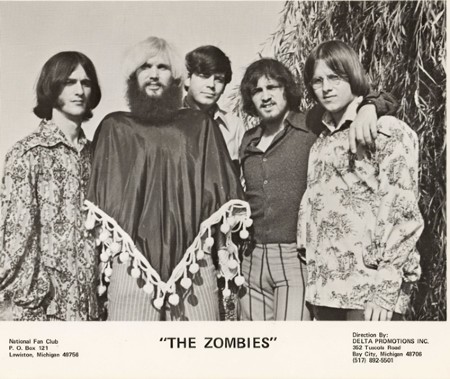 Terry Quirk, Howard Ylinen, Ed Rogers, John Heric, Garry Stockero
Terry Quirk, Howard Ylinen, Ed Rogers, John Heric, Garry Stockero
The band was made up of four former members of the Excels: Terry Quirk on rhythm guitar, Howard Ylinen on keyboards, Ed Rogers on bass, and Garry Stockero on drums. John Heric, formerly of the Ravelles from Iron Mountain, played lead guitar.
The Excels were a popular Beach Boys–inspired band who performed at Kehoe’s Bay City teen club, Band Canyon, on August 18, 1966. They were a regional success during the mid ’60s, recording a number of singles on the Carla label out of Detroit that charted on local radio. The Excels had several hit singles on Saginaw's two major Top 40 stations, WKNX and WSAM, and appeared numerous times at that city's popular teen club, Daniel's Den, as well as the Blue Light in nearby Midland, Michigan. 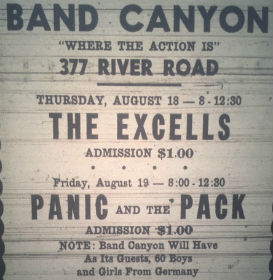
Kehoe admitted that he had put two fake Zombies groups on the road in the first Rolling Stone story, The 'Zombies' Are A Stiff, published in the December 13, 1969, issue of the magazine. Kehoe was interviewed and stated that after the "original" Zombies from Texas and Florida disbanded, another group took their place. "They really liked the original Zombies", Kehoe stated, "They really admired them." Kehoe went on to say: "They're not a new group, they used to be the Excels....oh, for about five or six years."
Hocott’s photos of the Michigan Zombies prove that four of the former Excels took part in the fake Zombies, but he claims he does not recall any of their names. Multiple phone calls and messages to the surviving members of the Excels were not returned until March 2017, almost nine months after Daniel Ralston's original story was published in BuzzFeed.
“They were so damn good,” Hocott says. “They were the perfect Zombies. If you heard them play ‘Time of the Season’ you couldn’t tell the difference.” They were so good that Delta Promotions felt comfortable increasing the size and scale of the tours. “They had a tour bus,” Hocott says. “We sent a road manager out with them.”
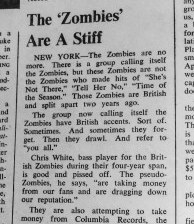 First Rolling Stone article
First Rolling Stone article
In the Rolling Stone article titled The ‘Zombies’ Are A Stiff, Chris White chastises the impostors for “taking money from our fans and dragging down our reputation.” He goes on to recount an incident where the fakes “had the cheek to phone up [the label] in Dallas and ask for $1,000 in publicity money.”
Dusty Hill refutes this accusation: “We were just making whatever we were making and happy to get some money to get another band together, but we didn’t do that.”
There is no information in the Rolling Stone article about the fake band members themselves but there is mention of a specific show on October 21, in Los Angeles at the Whiskey A Go-Go. As White remembers it now, friends of original Zombie Paul Atkinson went to this gig and managed to get the impostors on tape. “He had someone go along with a tape recorder as a journalist. They had a guitar player calling himself [actual Zombies drummer Hugh] Grundy. They asked him why he was now out front as the singer and he said, in a Northern England accent, ‘Well, the boys wanted me out front and I’m the only original member.’ Then the interviewer said, ‘Didn’t you used to be 5’10”?’ This guy was 5’6”. We had it on tape but I don’t know where it’s gone to now.” 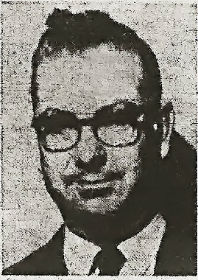 Bill Kehoe
Bill Kehoe
In most cases, Delta Promotions would claim its bands had one original member, as it did with the Saginaw News. When Rolling Stone contacted Bill Kehoe for comment in December 1969, he claimed that the “American Zombies” formed after “the lead singer of the Zombies was killed, and two other guys left.” He goes on to brazenly inform the magazine that the current Zombies are the second incarnation he’s created. “They’re not a new group. They used to be the Excels.”
In a recent phone interview, Garry Stockero stated that he and the rest of the Excels were invited to the Delta Promotions office on Tuscola Road after a gig at Roll-Air in Bay City. At the meeting, Kehoe and another Delta representative said that they wanted a vocal band that could duplicate the Zombies' sound and that the Excels would be perfect.
According to Stockero, they were provided a road manager and an old Greyhound bus for touring that had "The Zombies" painted on the sides. Stockero also recalled that Delta Promotions presented them as the original band from England, and that they did radio interviews and promos for the concerts posing as the British Zombies. Because the Excels were known in Michigan, Delta booked them outside the state. Stockero said that the venues ranged from smaller clubs to one concert at Utah State University that drew an audience of 10,000.
Chris White recounts a meeting at his label, CBS Records, in New York. Promoters at a radio station noticed the Zombies were coming to town and wanted to talk to him. “I said, ‘Well, it’s not the real Zombies, we are here.’ They said, ‘We don’t know, you might be the fake Zombies. How do I know you’re really Chris White?’ That’s when we decided to go back and do the third album and establish that we were alive.”
Reforming the band wasn’t something anyone was eager to do. Rod Argent and Chris White had a new band, Argent, while singer Colin Blunstone had started his solo career. But the existence of the fake Zombies provided a strong incentive. If a fan went to see the impostor band and left disappointed, it’s unlikely they’d purchase a record or buy a ticket to a future concert by one of the real band’s members. But despite their efforts, they abandoned the recording and wouldn’t release the proof-of-life album (RIP) until 2010. 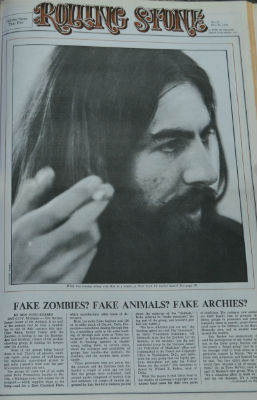 Rolling Stone cover story
Rolling Stone cover story
Backlash from the bands whose identities it had effectively stolen ballooned to the point where Delta could no longer keep up its charade. The beginning of the end came when a fake version of the Animals created by Delta were confronted at a performance by the founder of the actual Animals, Eric Burdon. According to an article titled "Fake Zombies? Fake Animals? Fake Archies?" in the May 28, 1970, issue of Rolling Stone by Ben Fong-Torres, Burdon had shown up to the show with a baseball bat.
Tom Hocott remembers getting a phone call from one of the fake Animals recounting this same story. “Eric Burdon and a bunch of bikers chased them around and threatened them,” he says. Burdon was contacted for this story; his wife Marianna responded with an email saying, “I asked Eric if he has any recollections of the incident you mentioned, but he doesn’t really.”
Kehoe and Delta Promotions were not exactly secretive in their recruiting efforts. The Woolies were a successful Michigan band from the Lansing area who charted nationally with their cover of Bo Diddley's "Who Do You Love" in 1967. Band leader and keyboard player Bob Baldori was approached in the Flap Jack Shack restaurant on Grand River Avenue by a Delta representative who asked him if the Woolies were interested in going on the road as the Animals. Baldori turned him down; but he included the incident in I'm Almost Famous, a 1980 musical comedy play that he wrote that was loosely based on the experiences of the Woolies in the 60s and 70s with club owners, record distributors, and some of the more sleazy elements of the music business.
Delta Promotions was also not above trying recruit its own employees for its fake bands. Mark Sanders was a former member of the Rogues, a young Midland group that was the original house band at the Blue Light, the city's popular teen night club. After he left the Rogues, Sanders was briefly employed by Bill Kehoe as a talent scout, hired to check out area bands and pass out information advertising Delta Promotions as a premier booking agency.
Sanders said that shortly before any of the imposter bands went on the road, Kehoe asked him if he was interested in joining the version of the Animals that Delta was putting together. Sanders, who had seen Eric Burdon and the original Animals perform at the Blue Light in 1966, felt that the offer was unethical and turned it down. Sanders left Delta Promotions shortly thereafter.
The second Rolling Stone article published on May 28, 1970, mentioned the existence of another fraudulent Delta Promotions group, and the one that would finally lead to the company’s undoing, The Archies. The Archies were a cartoon — not the way Ozzy Osbourne or Keith Richards are cartoons but actual cartoons. They were a fictitious band comprising characters from the Archie Comics universe, an entity in partnership with Don Kirshner, who also created the Monkees. Kirshner was a very successful music publisher and a shrewd businessman. He took the popularity of the comic book characters and turned it into hit records like “Sugar Sugar” and “Jingle Jangle.” Hocott believes the fake Archies consisted of members of a folk group called the Gooseberry Jam.
While it might seem like this would be the easiest con to pull off for Delta, since there were no real Archies at all, that was not the case. Unlike the disbanded rock bands and their labels, Kirshner Productions was a well-oiled machine ready to take down any dubious claims to the music of its properties. “We’ve heard about this group and our lawyers are taking action,” Kirshner, who died in 2011, told Rolling Stone. 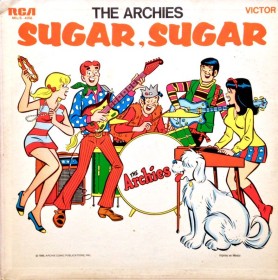
The man hired by Bill Kehoe to handle the fake Archies was Bay City native Thomas "Joe" Jamrog. Jamrog was a good friend of Tom Smith, one of the founders of a Bay City teen band called The Epics, and he hung out with the band at Smith's house where they usually rehearsed. Jamrog helped carry the band's equipment which got him in free at their gigs and also gave him an in when chatting up the girls who were attracted to the bands and the local music scene.
He first met Bill Kehoe through The Epics after Kehoe became their manager and started booking the band through Delta Promotions, often at Band Canyon where he was a part-owner. Although Jamrog had a good job at Saginaw Steering Gear, he found the music business much more exciting and had dreams of pursuing a career as a promoter.
"Tom Smith set up my meeting with Kehoe", Jamrog recalled. Because he had a reputation for being honest, Kehoe felt that Jamrog was a good choice to become a road manager and to make sure that Delta Promotions got its cut when one of its bands got paid for a gig. Jamrog was given an office at the Tuscola Road location with a desk and phone to set up gigs. He was then put in charge of a Boston group called Gooseberry Jam that Kehoe had hired to perform as 'The Archies'. Jamrog said that Kehoe had "somehow copyrighted the name for the purpose of putting a band on the road to perform under that name."
After setting up a small tour for the fake Archies in New England, Kehoe bought an old Greyhound bus for Jamrog and the band to use on the road. When the engine blew up in Cleveland while Jamrog was driving to meet and travel with the band in Vermont, Kehoe booked a flight for him. It was the first time Jamrog had ever been on a plane.
Following the purchase of an old school bus on the East Coast, Jamrog and the band completed the gigs in New England and then drove to Michigan where they played a date at Delta College before leaving for a tour of the West Coast.
Unfortunately, the school bus broke down in Nebraska. Jamrog managed to get a Lincoln Continental for the band members along with a U-Haul trailer for their equipment and proceed to their first date. Jamrog remembered that they they were late for their gig at a teen club in Boise, Idaho, after getting a speeding ticket; but he cooled the situation with the club owner and got the band on stage. While helping break down the band's equipment after the show, Jamrog had the Archies' leader collect the money.
After agreeing to meet and deal with the money the following morning, Jamrog said that he awoke to find that the band had skipped town and left him high and dry. After calling Kehoe to let him know what had happened, he flew to Eugene, Oregon, to check out a band to replace the first fake Archies. According to Jamrog, the new group worked out very well, but the May 28, 1970, Rolling Stone story put an end to Kehoe's scheme and Jamrog's career at Delta Promotions.
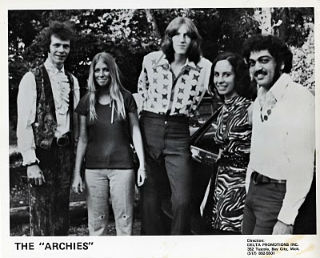 Delta's Fake Archies
Delta's Fake Archies
Kirshner’s words in the Rolling Stone article must have given Bill Kehoe cause for concern. Just two weeks after the article ran, a headline appeared in the Bay City Times: “Band Promoter Quits, Blasts DJs, Mafia.” The article was Kehoe’s attempt to get out in front of the controversy. He expressed disgust and exhaustion with the music business, without mentioning the lawsuits (and baseball bats) encroaching on the Delta operation. “We never represented to anyone that these were the same groups who made the records,” Kehoe claimed. This is in direct opposition to statements from disc jockeys and promoters in the Rolling Stone story who say Delta provided phony affidavits claiming the bands featured original members. One DJ says such documents were promised by Delta but never delivered.
Later in the Bay City Times article, Kehoe turned his ire to the bands themselves, especially the fake Archies. “In two years I lost $20,000 in the business. One of the groups wrecked a bus we bought for them and some didn’t pay us back money we advanced them,” he said, adding that his pet peeve is “groups who cheat us every chance they can.” 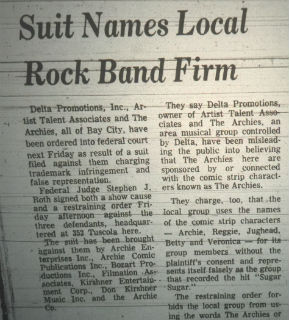 Bay City Times story
Bay City Times story
When I mention Kehoe’s claim, Mark Ramsey responds, “I was making $200 a week and it wasn’t like we’d play a night and then get a few days off. They had us playing shows every single night.”
After closing up shop, Kehoe poured his time into his legitimate business dealings, including a short-lived partnership with Roger D. Ricker in another promotion company called W.E.R.D. and, later, an engineering company.
Bill Kehoe's obituary does not mention his time working in the music business. “It just didn’t work out,” Kehoe said in the Bay City Times story. “When all you do is lose money…there’s not much to do but quit. But regardless of what others would have you think, at least I can quit knowing I stayed honest.”
Following his music business experiences, Joe Jamrog went to work at Graphic Metals in Bay City and later at the Sutherland Bakery. Although he described Bill Kehoe as "a nice guy to work for," Jamrog had no contact with his former boss after leaving Delta Promotions.
With Delta Promotions dissolved under pressure from outside, the bands on the Delta roster headed back home. Terry Quirk and Ed Rogers were finally contacted by phone in March of 2017, but only Quirk was willing to talk about his time in the Michigan Zombies. Quirk stated that the Excels had basically broken up in late 1968 when their lead singer and guitarist, Clark Sullivan, left the band to pursue a solo career. The four remaining members were contacted by Kehoe who told them that he had all kinds of ideas for the band. They were looking for a record deal and recruited John Heric, a singer and guitarist from another Upper Peninsula band called the Ravelles, to replace Sullivan. 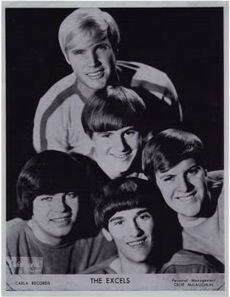 Clockwise from top: Howard Ylinen, Garry Stockero, Clark Sullivan, Terry Quirk, Ed Rogers
Clockwise from top: Howard Ylinen, Garry Stockero, Clark Sullivan, Terry Quirk, Ed Rogers
Kehoe told them that he had copyrighted the name 'Zombies' and that they would be the original Zombies' backing band if any of them decided to regroup and come to America. Quirk said that they "bought Kehoe's proposal hook, line, and sinker." They studied the Zombies' albums, and the band learned the songs and vocal parts to the extent that they could perform the material and sound almost exactly like the original recordings.
Delta Promotions provided them with a tour bus with 'Zombies' printed on it along with a road manager. The Michigan Zombies were booked outside of the state, as far west as California, and included the aforementioned date at the Whiskey A Go-Go in Los Angeles. They even did some radio promos. Quirk couldn't remember exactly how much they were paid, but said "it wasn't much; and it wasn't enough to sustain the band", especially since Quirk was married and had a child and Heric also had a wife to support.
When the Rolling Stone stories came out, Quirk said that the band became disillusioned with the music business. They felt "kind of naive and stupid" and realized that they had been "hoodwinked" by Kehoe and Delta Promotions. As a result of the press coverage, Quirk tried calling Rod Argent in England to check on things; and both he and the band quit after a Zombies' representative told him that Kehoe's scheme was not on the up and up.
Quirk said that the experience decimated him, and that he did not resume his music career until after he moved his family to Colorado in 1973. There, he formed a band with his wife and brother called Quirk. They played ski resorts from Santa Fe to Jackson Hole and recorded in both Nashville and Los Angeles before retiring the band in 1976. 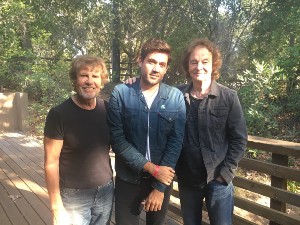 Rod Argent, Daniel Ralston, Colin Blunstone
Rod Argent, Daniel Ralston, Colin Blunstone
In the spring of 1971, Ed Rogers, Howard Ylinen, and Garry Stockero signed on with their former lead singer Clark Sullivan in a band called Liberty. Working with the legendary Ollie McLaughlin, who had produced all of the Excels' singles on his Detroit-based Carla label, Liberty recorded a single called "Girl, You Better Wake Up" on BASF Records. Liberty went on to play for seven years as the house band in a club at Shore Acres Golf Course near Lake Fenton and at various nightclubs around Flint, Michigan.
The Texas Zombies returned to Dallas where they ditched their Zombies past and returned to their normal lives. Seab Meador was in The Werewolves and made two albums for RCA records; he died of a brain tumor on January 24, 1980. Mark Ramsey decided to go to college, studying to become a teacher, but kept his chops up in case Seab, Dusty, or Frank ever needed a guitarist. When Meador died, Ramsey gave up on the rock ‘n’ roll dream. “It just changed for me. He was sweet and kind. I just kinda stopped wanting that life.”
Hill and Beard formed ZZ Top with guitarist and singer Billy Gibbons; they released their first album in 1970 and have since sold around 60 million albums worldwide. Ramsey crossed paths with them a few times over the years that followed before all communication eventually stopped. 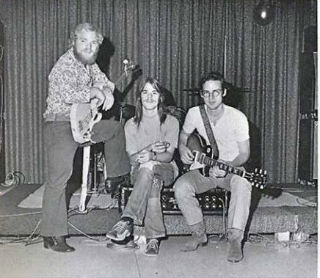 ZZ Top 1971: Dusty Hill, Frank Beard, and Billy Gibbons
ZZ Top 1971: Dusty Hill, Frank Beard, and Billy Gibbons
About 10 years ago, Tom Hocott claims he tried to talk to Dusty Hill backstage at a ZZ Top gig in Grand Rapids. He hoped for a brief audience with Hill — one conversation to fill in the gaps that still remained for him in the story, to congratulate Hill on his success, and to reminisce about the strange history that they both shared. But Hill turned Hocott away. “He acted like he didn’t even remember,” Hocott recalls. (“I’ll say it again,” Hill responds. “It was the ’60s.”)
*Gary J. Johnson provided contact information for interviews as well as band photos, news stories from the Bay City Times and Saginaw News, along with the original magazine articles from Rolling Stone that contributed to Daniel Ralston’s story that was published in BuzzFeed in 2016. Since that time, he and Ralston were able to uncover additional information about the Excels and others. Those facts were added to Ralston's story, along with some additional photos, when Bay City's Fake Zombies Scandal was uploaded to the MRRL site in 2017.
In 2024, Daniel Ralston produced a fascinating 8 episode podcast on iHeartRadio titled The True Story of the Fake Zombies. He is currently pursuing a movie deal for the story.

